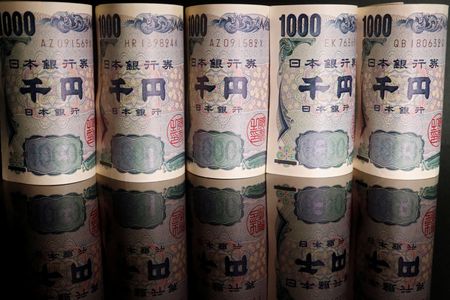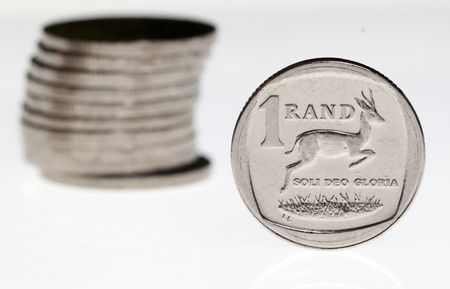By Caroline Valetkevitch
NEW YORK (Reuters) -Major stock indexes were little changed on Tuesday as investors digested the latest news in U.S. President Donald Trump’s tariff rollout, and the yen extended its slide against the dollar on planned 25% duties on goods from Japan.
On Monday, Trump sent letters to 14 countries, including major Asian trading partners such as Japan and South Korea, saying they face sharply higher tariffs on imports into the United States starting from a new date of August 1.
Stocks sold off on Monday but market reactions have not been as severe as in the aftermath of Trump’s sweeping tariff announcement in early April. Some market watchers expect countries to seek trade deals with the United States before the new deadline.
European stocks held firm, with sources saying the European Union will not be receiving a letter setting out higher tariffs and that the EU could reach a trade deal by Wednesday.
“It’s kind of a sluggish day. People digested the tariff news yesterday, and we saw weakness. People are kind of on hold until we start seeing second-quarter earnings come out,” said Peter Tuz, president of Chase Investment Counsel in Charlottesville, Virginia.
S&P 500 companies will soon begin reporting on the quarter that ended June 30.
The Dow Jones Industrial Average fell 101.09 points, or 0.23%, to 44,305.27, the S&P 500 fell 2.26 points, or 0.04%, to 6,227.72 and the Nasdaq Composite rose 1.33 points, or 0.01%, to 20,413.85.
MSCI’s gauge of stocks across the globe fell 0.36 points, or 0.04%, to 919.57. The pan-European STOXX 600 index rose 0.33%.
Hopes of trade deals buoyed risk appetite for regional assets on Tuesday as MSCI’s broadest index of Asia-Pacific shares outside Japan rose 0.5%, while Japan’s Nikkei reversed early declines and finished 0.26% higher.
Southeast Asia’s biggest economies are among those facing the highest U.S. tariffs. South Korean shares recorded their strongest daily gain in two weeks and the won firmed 0.4%.
The lack of progress on trade has loomed over markets since Trump capped in April what he called reciprocal tariffs with trading partners at 10% for three months to allow for negotiations.
Only two agreements, with Britain and Vietnam, have been reached and in June, Washington and Beijing agreed on a framework covering tariff rates.
Minutes from the last Federal Reserve meeting will be released on Wednesday. The central bank has been taking a wait-and-see approach to monetary policy.
The export-dependent Japanese yen hit a two-week low of 146.65 per dollar and also weakened against a host of other currencies. Against the yen, the dollar was last up 0.6% at 146.9.
The Australian dollar rose after the country’s central bank defied market expectations and left its cash rate steady at 3.85%.
U.S. Treasury yields rose, with investors awaiting Treasury’s sales of $119 billion in coupon-bearing debt this week. The yield on benchmark U.S. 10-year notes was last up 3.6 basis points at 4.431%, the highest level since June 20.
U.S. crude rose 0.19% to $68.06 a barrel and Brent rose to $69.86 per barrel, up 0.4%.
(Reporting by Caroline Valetkevitch in New York; addditional reporting by Rocky Swift and Johann M Cherian; Editing by Sonali Paul, Saad Sayeed, Emelia Sithole-Matarise and Rod Nickel)













